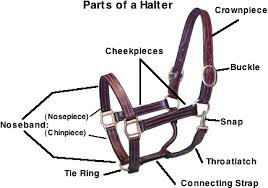halter
英 [ˈhɒl.tər]
美 [ˈhɑːl.t̬ɚ]
- n. 缰绳;绞索
- vt. 给…套上缰绳;束缚
- n. (Halter)人名;(德、罗)哈尔特;(法)阿尔泰;(英)霍尔特
星级词汇:

记忆方法
1. "that by which something is held".
2. hold => halt => halter.
2. hold => halt => halter.
中文词源
halter 马的笼头,女式露背装的绕颈系带
来自古英语haelftre,牵马绳,马笼头,来自PIE*kelp,握住,抓住,词源同helm,helve.引申词义女式露背装的绕颈系带。
英语词源
- halter (n.)
- Old English hælfter "rope for leading a horse," from Proto-Germanic *halftra- "that by which something is held" (cognates: Old Saxon haliftra "halter," Old High German halftra, Middle Dutch halfter), from suffixed form of PIE *kelp- "to hold, grasp" (see helve). Also "hangman's noose" (mid-15c.). In women's clothing sense, originally "strap attached to the top of a backless bodice and looped around the neck," 1935, later extended to the tops themselves.
权威例句
- 1. She was dressed in a halter top and shorts.
- 她穿着三角背心和短裤。
- 2. We must lead an ox by the halter.
- 牵牛要牵牛鼻子.
- 3. Name not a halter in his house that hanged himself.
- (谚语)房里有人吊死,千万别提绳子.
- 4. Two colored boys walk by , leading a mule by the halter.
- 两个黑人小伙子牵着一头驴子走过.
- 5. The groom unsnaps the halter.
- 马夫把缰绳解开.
